Tuesday, December 12, 2006
Merry, merry...
A blonde goes to the post office to buy stamps for her Christmas cards. She says to the clerk, "May I have 50 Christmas stamps?"
The clerk says, "What denomination?"
The blonde says, "God help us, has it come to this? Give me 6 Catholic, 12 Presbyterian, 10 Lutheran and 22 Baptists."
One more...
A man in Phoenix calls his son in New York the day before Christmas and says, "I hate to ruin your day, but I have to tell you that your mother and I are divorcing; forty-five years of misery is enough."
"Pop, what are you talking about?" the son screams.
"We can't stand the sight of each other any longer," the father says. "We're sick of each other, and I'm sick of talking about this, so you call your sister in Chicago and tell her."
Frantic, the son calls his sister, who explodes on the phone. "Like heck they're getting divorced," she shouts, "I'll take care of this!" She calls Phoenix immediately, and screams at her father, "You are NOT getting divorced. Don't do a single thing until I get there. I'm calling my brother back, and we'll both be there tomorrow. Until then, don't do a thing, DO YOU HEAR ME?" and hangs up.
The old man hangs up his phone and turns to his wife. "Okay," he says, "they're coming for Christmas AND paying their own way."
I'll be here until the 24th. Remember to tip the guy in the red-and-white suit and put your loose change in the kettle.
Friday, November 17, 2006
Anniversary
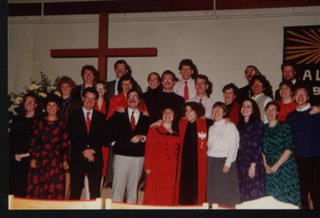
15 years ago today I was ordained into the Christian ministry in the United Church of Christ. For a minister an ordination is right up there with one's wedding and the birth of one's children. It's a powerful experience. Words do not do it justice. But I'll try.
I wore my father's robe. I still wear it to this day whenever I preach during the cooler months as it is made out of a heavy poplin. I was supposed to be the last to enter in the procession but the moderator of our church (seen behind me in the last picture below) insisted I lead everyone in. My new colleague, Rev. Bill Youngkin from Dayton, OH, and two other gentlemen from the church I was serving, came to celebrate with me. My three closest girlfriends--one from high school, one from college, and one from seminary--all participated in the service. I sang a duet with a woman friend from the church I grew up in, this church in which I was being ordained; all the music in the service was from "Godspell". I was surrounded by people who had watched me grow up in the church and a huge crew from Andover Newton Theological School (see photo above), the seminary from which I graduated.
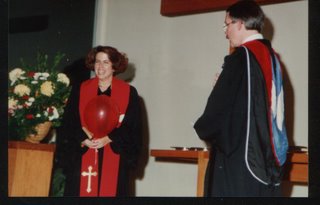
I hardly ate at all that whole day. I don't remember having breakfast before church that Sunday morning, and all I had for lunch was a bite of a pb & j, maybe a swig of milk. The ordination was at 5:00 p.m. with a reception afterward. I was so busy greeting family and friends that I didn't have a chance to nibble at the plate of food someone thoughtfully brought me. Then a select group of us adjourned to the Elks hall in Pembroke, MA for a dance with a dj, dessert, coffee and tea. Again, not a morsel passed my lips as we toasted, opened presents, and boogied the night away. The party broke up at around 10 p.m. but I was not ready to retire for the night. Two friends were headed for the Hard Rock Cafe in Boston and I asked if I could come with them. As we made our way toward the highway I asked if we could go through the drive-thru at Burger King; I was famished and could not wait until we made it to Boston. I did not go to bed until 2 a.m.!
I don't know if it was the Holy Spirit or pure adrenaline I was running on; perhaps a mixture of both. I do know that it was a great way to start the next chapter in my life. I wish everyone could have a day like that for the beginning of one's own life as an adult or when making a meaningful change: surrounded by friends and family, making promises and a commitment toward the future in front of God and everyone, and then a huge party afterward. It gives one the sense of being truly loved and of owing something back for all that has been received, a sense of being responsible in a joyful, giving way.
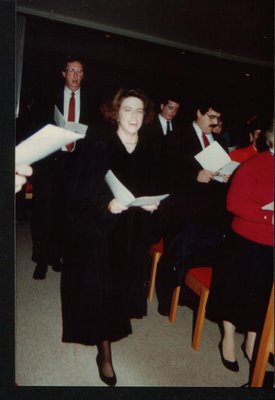
This was the opening prayer for the ordination service, written by Methodist minister/author Ted Loder. I return to it from time to time to remind me of who and where I came from and that God is still not finished with me.
Come, Lord Jesus,
expand me,
by your power, life-generating as the sea
to accept
and use my power
to do something I believe in
and be something more of who I mean to be
and can be;
to inspire me to dream and move,
sweat and sing,
fail and laugh,
cuss and create;
to link my passion with courage,
my hope with discipline,
my love with persistence;
to enable me to learn from difficulties,
grow in adversities,
gain wisdom from defeats,
perspective from disappointments,
gracefulness from crises,
and find joy
in simply living it all fully.
Release me through your power
to be a powerful person, Lord. Amen.
Thursday, November 16, 2006
"I'm Too Much!"

Couldn't you just die?!
The perfect desk ornament. Put both up at the same time or switch on and off, depending on your Yuletide mood. Usually I can't stand Christmas decorations before December, let alone Thanksgiving, but these were just too much to pass up.
Is it me or does Snow Miser look a lot like the Winter Warlock in "Santa Claus is Coming to Town"? Actually, now that I think about it, Heat Miser bears a striking resemblance to the Burgermeister. You'd think the creative team behind these Christmas specials could be a little more, well, creative.
You can find them here. Be the first in your office.
Tuesday, November 14, 2006
November
remember the dead
and those still
with us draw breath
Remember veterans
and armistice
reasoning for war
the wreckage of a man’s
and a woman’s
living, family, a nation,
a world, that it never ends
anything but life
Remember to vote
that fierce whisper
amid the chattering clamor
power to say enough
Remember
a thwarted gunpowder plot
all those who would tear
asunder that which is joined
Remember to give thanks
not eat too much
make room at the table
and that Advent is coming soon
Remember me, he said
whenever you break bread
and pour wine to share
Remember
students in Prague
and the Velvet Revolution
the golden queen’s
ascension and deathbed
remember the Compassionate
One enthroned in Tibet
yet to return
Remember the owl
her silent flight beneath
Orion's watchful eye
the cloistered bee
the beauty of bare trees
a carpet of russet and gold
not to be seen for another year
Remember
the seed, the sunken bulb,
the misplaced acorn and walnut
the promise of life
cycled within death
Monday, November 06, 2006
Leave me alone...I'M VOTING!

(I put in the cartoon just because it's so damn true.)
I'm tired of the political mailings, 4 to 6 of them a day, from various candidates and committees. The ads on TV may have to be registered on the list of dangerous substances as they can cause headaches, drowsiness, coma, and feelings of suicide. A PAC, one of the many who have tried to nail us down, called my husband, wanting to know which way he was going to vote on Tuesday and he replied, "Yes, I am going to vote, and how I will vote is a private matter (PC for none of your business)." My sentiments exactly.
P.S. My husband, David, came up with the title to this blog.
P.P.S. Since when was 'nevermind' one word?!
Tuesday, October 17, 2006
Redemption
Rick's only wish is that one day he could push his dad.

Team Hoyt
Sunday, October 08, 2006
Integrity

Job 1:1, 2: 1-10; Ps. 26; Hebrews 1: 1-4, 2: 5-12
***** United Church of Christ
October 8, 2006
As I was preparing for this sermon, I searched the internet for a photo or a piece of artwork that would illustrate the theme of integrity. I post my sermons on my weblog, usually with an image that embodies the text of the sermon.
So I went to Google.com and typed in the word integrity, which Webster’s defines as honesty, incorruptibility or the state of being complete or undivided. I found hundreds of images: some were for business WebPages, some were for school and college websites; one was a picture of the residents and staff of Integrity House, a home for those with cognitive disabilities. I even found a billboard sign from New Zealand displaying the value of integrity in the community.
The most striking image for the word integrity was a pair of grimy, filthy, cupped hands: hands that looked like they hadn’t seen water in months. They were the hands of a man: somebody’s father, son, or brother. They looked like they had been used bare to dig for survivors for days on end at some ground-zero site, any ground zero: an earthquake, a plane crash, a bomb site, the mountain of rubble from the World Trade Center. Or hands used to dig through a city dump for a living and a few scraps of food. They could have been the hands of a homeless person, outstretched for a few coins and a little mercy. They could have been the hands of a soldier or an insurgent. They looked like the hands of someone who had suffered much and lost everything, yet could still form their hands into the shape of hope, hands waiting to receive yet able to give and be thankful.
They looked like the hands of Job. Here is a man who has, indeed, lost everything: his children, his livelihood and all of his livestock, and his good health. All he has left is a broken piece of pottery with which to scrape his sores, his wife who is ready to curse God (and who can blame her), and a few friends who come to sit with Job in his suffering and offer their fair-weather advice and religious platitudes. Eventually he rages against these friends and protests his suffering before God who comes to Job not in a vision bathed in light but in the eye of a violent storm, leaving Job’s knees quaking.
Yet at this point in the story, Job persists in his integrity, in his incorruptible faith. Even though he has nothing, still he says nothing against God. Even in his great suffering, Job is still faithful to God. He does not allow his suffering to alter his fundamental belief that God is in charge of the universe. He still has his hands offered as a cup, waiting on the mercy of the Lord. Job asks: How can we give God credit for the good days and yet curse him for the bad? Are we not then fair-weather friends of God ourselves? Yet how can we give thanks in all things, even in our suffering? How can we retain our integrity, how can we remain incorruptible, in the face of pain and anguish?
This is the same question that Israel must have been asking herself during and after the time of exile in Babylon: How can we sing the Lord’s song in a foreign land, in a place where our faith is mocked? It is estimated that the book of Job was written in an early period after Israel had returned from its Babylonian exile, a time of great suffering for the people of Israel. The city of Jerusalem had been destroyed and the temple along with it. The people had not been allowed to worship Yahweh in their captivity but had to worship the Babylonian gods instead. It was difficult to remain faithful and to keep one’s integrity, one’s guileless honesty before God. The story of Job is universal, in that it is the story of all those in relationship to God when in the face of suffering.
When all has been taken away from us, when all that is familiar and usual is gone, when we can’t even recognize ourselves as whom we used to be, how do we worship God? How do we meet God in the midst of our suffering?
All of us deal with suffering in our own way. Some of us retreat from the church, finding it difficult to be with our sisters and brothers in faith. Some of us become trapped in the belief that our suffering is equal to falling short in our faith; we don’t feel as close to God when we are in pain. We think of ourselves as different from others because of our pain and assume that no one can enter into it with us. Often our well-meaning friends can sound like the friends of Job, wanting to fix whatever situation we’re in, offering answers for questions that have none, further pushing us into the solitary confinement of our feelings.
Our culture teaches us to medicate our suffering, to cover it up or distract ourselves from it with any number of ways, by being a consumer and spending our money, indulging in pleasures and leisure activities, feeling good by looking a certain way, to more hurtful and self-destructive practices such as drinking and eating to excess, abusing drugs and keeping our pain to ourselves. There is no place for suffering in our culture, lest it become like a disease that is catching. We try to avoid suffering, but more often than not, it finds us regardless of our careful watching.
Suffering is an inevitable condition of the human experience. Perhaps there are days when it feels like God and the Devil are playing a game of chess with our lives. Suffering comes as a result of living in flesh and loving life and those around us with our whole heart. Jesus knew that.
The grace of suffering is not that we are to find God in it but that God finds us and meets us in our suffering. Through the life and death of Jesus, God comes to us and “shares our common lot, conquering sin and death and reconciling the world”. The author of the book of Hebrews tells us that through Jesus, we learn how to suffer and to keep our integrity as faithful people. By opening ourselves to suffering, not by our ego or through any false sense of piety, but by trusting in God’s grace we open ourselves to God and the possibility of transformation.
The most recent scene of great suffering that has transfixed all of us has been the lines of black horse carriages following hearses in Lancaster County, PA earlier this week. The suffering of the Amish people seems all the more poignant in that they have rejected our American gun culture and yet could not be safeguarded against it. Even more heartrending are the reports of the relatives of the young girls calling for forgiveness for the man who chose to suffer his rage and remorse upon the innocent. With courage that must have come from deep faith in God, the oldest of the girls asked to be shot first, hoping to spare the younger ones. Families of the slain girls have gone so far as to reach out to the family of Charles Roberts, realizing that they too have lost someone they loved. About half of the 75 people that attended Roberts’ funeral were Amish.
All of these actions are a witness to integrity in faith in the face of great suffering. The Amish have been depicted as traditional Christians that emphasize the importance of forgiveness, as if they are the only ones who believe that. I have heard others say that it is too soon for forgiveness. All of us who follow Jesus know of this radical forgiveness. From the cross Jesus forgave those who crucified him, saying that they did not know what they were doing. It is never too soon for forgiveness. What is astounding about the Amish is that they are acting upon the belief in radical forgiveness as a community that is rarely seen in other Christian quarters. Even in the midst of suffering, healing can be found through love, forgiveness, compassion, and the willingness to open our hands to God and to give thanks.
When we allow suffering to harden our hearts and close our fists, we allow ourselves to lose our integrity before God. We are no longer whole-hearted and undivided. Yes, we feel anger, sadness, and despair when we suffer but God is more than big enough to take it and to listen. When we open ourselves to our suffering and to the suffering of others in the presence of God, there is power to be transformed, to be made more of who we are, which is a child of God. We were created to be loving, compassionate, giving reflections of the One who made us. Our sufferings connect us to others in a mysterious way and remind us that all we really have is how we treat each other.
In the Buddhist faith there are what are called the Five Remembrances, five truths to remember about the human condition, and they are universal.
- I will grow old.
- This body will know sickness.
- There is no escape from death.
- Everything and everyone changes.
- All I have are my actions.
Suffering does and will happen. It is a fact of life. How we respond to it can mean the world of difference to the integrity of our souls and the lives of those around us. But we cannot do this alone nor are we meant to. Paul said in his first letter to the Corinthians that when one suffers, all suffer together; when one rejoices, all rejoice together. The gift of community is that we are absolved of the burden to be complete. You are complete; you have integrity because this church is in covenant to God and to other faith communities. I encourage you to nurture that covenant. It is through the completeness of this beloved family of faith that you are able to worship God in the midst of suffering. Through your actions with one another, even when you are in pain, you can communicate the deep love that God has for all persons.
How has this faith community remained incorruptible and kept its integrity in the midst of suffering? How have you allowed suffering to open you to God’s new possibilities? When have you, as an individual and as a congregation, kept your hands open to God and when have you closed them? How do you allow your own suffering to connect you others who are suffering and to the suffering of Jesus on the cross? How have you reached out to other faith communities in their suffering and rejoicing? What keeps you coming back, week after week?
The God of Job, the God of Jesus Christ, is the God who invites us to come and die as well as to come and live. God promises to be with us in the face of suffering, to suffer with us, and to welcome us on the other side. God calls us to integrity, to be incorruptible and honest in our faith, to love with whole and undivided hearts, to find our completeness in community, to keep our hands open: willing to receive whatever comes yet able to give and be thankful. Amen.
Tuesday, October 03, 2006
Revelation
This is an incomplete list, in no particular order, of those books and films which have shaped my evolution as a spiritual being. In a way they have become like another bible, in that I return to them again and again for nurture, instruction, challenge, comfort and reproof. I invite you to share your own personal list of those sources that inform you how to be loving, compassionate, forgiving, generous, ethical, and open.
Books
The Education of Little Tree, Forrest Carter
Contact, Carl Sagan
A Wrinkle in Time, Madeleine L'Engle
Two-Part Invention, Madeleine L'Engle
Parable of the Sower, Octavia Butler
She's Not There, Jennifer Finney Boylan
Amazing Grace, Jonathan Kozol
Practicing Resurrection, Nora Gallagher
The Year of Magical Thinking, Joan Didion
Man's Search for Meaning, Viktor Frankl
Traveling Mercies, Anne Lamott
If Grace is True, Philip Gulley & James Mulholland
Beyond Belief, Elaine Pagels
The Gnostic Gospels, Elaine Pagels
Mutant Message Down Under, Marlo Morgan
A New Christianity for a New World, John Shelby Spong
Dance of the Dissident Daughter, Sue Monk Kidd
The Secret Life of Bees, Sue Monk Kidd
The Girl Who Loved Tom Gordon, Stephen King
The Road Less Traveled, M. Scott Peck
The Luminous Web, Barbara Brown Taylor
A Woman's Worth, Marianne Williamson
Living Buddha, Living Christ, Thich Nhat Hanh
Going Home, Thich Nhat Hanh
Ishmael, Daniel Quinn
Poetry collections
Given, Wendell Berry
God Went to Beauty School, Cynthia Rylant
Mules of Love, Ellen Bass
For Earthly Survival, Ellen Bass
Collected Lyrics of Edna St. Vincent Millay
Collected Poetry of Sylvia Plath
Collected Poetry of Robert Frost
Films
The Shawshank Redemption
Amadeus
Babette's Feast
Gandhi
Chocolat
Jesus of Montreal
Star Trek II, IV, VI
Star Trek: Generations, First Contact, Insurrection
The Song of Bernadette
Contact
After Life (Japanese)
Not One Less (Chinese)
Brief Encounter
The Matrix trilogy
Lord of the Rings trilogy
Chariots of Fire
Resurrection
Shadowlands
The Karate Kid
L.A. Story
G.I. Jane
Groundhog Day
The Joy Luck Club
Grand Canyon
A River Runs Through It
Phenomenon
Field of Dreams
Crouching Tiger, Hidden Dragon
The Right Stuff
Plus, there's a new TV series "Heroes" on NBC that's really got me fired up. This show, in addition to the lists above, help me know in more tangible ways that I am not alone, that there are others who are thinking and wondering and questioning many of the same things, what scientists call synchronicity. The power and the gift of revelation (the mystery revealed), in the context of community, is to know that we are not alone in this vast universe. This is our greatest fear, which I believe fuels most of the violence in our world. It is my hope that one day we will evolve beyond this fear, realizing the holy and the good within each one of us.
Monday, September 18, 2006
Truth, justice and the American way?
When I write and then preach a sermon, it's really all one sermon; every single one of them. It's all about truth, love, compassion, giving, and being open.
But sometimes it needs to be said in a way that wakes you up. Author Sue Monk Kidd wrote, "The truth will indeed set you free, but first it will shatter the safe, sweet way you live." See, I don't say anything original, but I can quote those who do and report it here for you, dear reader.
So, for the next few blogs I will be quoting some great thoughts, ideas, rants: truths, for your contemplation.
The first is a video of George Carlin being, well, George. But his tune has changed. This is one hell of a rant that I could never get away with but George can, God bless him. He goes a bit far, but one has to, in order to wake those who are comfortably asleep.
Ready?
Who controls America?
Truth, justice, and the American way can no longer be used in the same sentence. Superman will have to find something else (perhaps someone else) to fight for.
Friday, September 01, 2006
Where is God?
A couple had two little boys who were always getting into trouble. Their parents knew that if any mischief occurred in their village, their sons were probably involved. The boys' mother heard that an elder in town had been successful in disciplining children, so she asked if he would speak with her sons. The elder agreed, but asked to see them separately.
So, the mother sent her youngest son first, in the morning. The elder, a huge man with a booming voice, sat the boy down and asked him sternly, "Where is God?" The boy's mouth dropped open, but he made no response. So the elder repeated the question in an even sterner tone, "Where is God!!?" Again the wide-eyed boy made no attempt to answer. The elder raised his voice and bellowed, "WHERE IS GOD!?" The boy screamed and bolted from the room, ran directly home and dove into a closet, slamming the door behind him.
When his older brother found him hiding, he asked,"What happened?" The younger brother, gasping for breath, replied, "We are in BIG trouble this time. God is missing, and they think WE did it!"
Just drop a fifty in the offering plate, and be sure to stay for coffee hour. I'm here every Sunday at 10:00 a.m.
Monday, August 28, 2006
Sacred Space
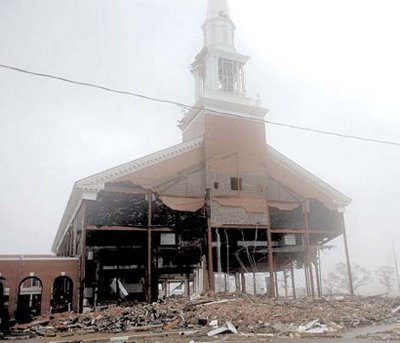
*********** Congregational Church
August 27, 2006
In the Celtic spiritual tradition, pilgrims often drew a circle around themselves before embarking on a journey. The pilgrim would point her finger outward and rotate in a clockwise direction until she completed the circle. This practice of faith, the “caim” or “encircling”, reminded the traveler that God surrounds him wherever he goes. Despite the danger that threatens personal safety, the “cosmic powers of this present darkness”, or any antagonists of the faith, the pilgrim is constantly within the circle of God’s protection, the everlasting circle of divine love.
Circle me, Lord. Keep protection near and danger afar.
But can God’s presence, God’s love be contained in a circle around us? Just as Solomon acknowledged that even heaven and the highest heaven could not contain the Creator of the universe, much less the temple, the house of God that Solomon had built, we recognize that in this ritual it is we who are contained in God’s limitless presence and power.
What makes a space sacred space? What makes this church building a sacred space? Were the lumber and nails and bricks and mortar blessed by prayer? Is it because of the floor plan, the placement of pews and pulpit and lectern? What made the temple in Jerusalem a sacred space? Was it the presence of the Ark of the Covenant? Was it the priests and their presiding over the sacrifices and burnt offerings?
Imagine what it would be like for your congregation if you no longer had a sanctuary in which to worship or around which to center your lives. Imagine living separate from one another, from your sisters and brothers in covenant and feeling separated from God. This coming Tuesday will be the one year anniversary of Hurricane Katrina and those that followed. So many churches were damaged or destroyed. Many church members were forced out of their homes or moved away. Some died. Pastors and church staff members are still ministering while under heavy burdens of recovery themselves. Worship space and practices have had to take different forms in order for congregations to remain viable. What we think of as sacred space may be out of place with our brothers and sisters on the Gulf coast. If there wasn’t a church building for a church, what then would define sacred space?
At the church where I am a member, we refer to the place where we worship as the ‘meetinghouse’ instead of ‘sanctuary’. It goes back to our Puritan mothers and fathers, who stripped the worship space of all adornment and symbols. It is not the cross or the Bible or stained glass that makes this place holy. These and others are reminders of the divine presence. It is what we do in this space that makes it sacred. God’s presence is very real and palpable when we express that presence in our worship and in our life together.
I am the Church/You are the Church/We are the Church together!
All who follow Jesus/All around the world/Yes, we’re the Church together!
The Church is not a building/The Church is not a steeple/
The Church is not a resting place/The Church is the people!
Yes, we are the Church: you, me, everybody! And not just the people we like and agree with, but the people we don’t like and disagree with; they are the church too. And those who have yet to be welcomed, those who are on their way here, they are the Church too. It is what we do in God’s name that makes a space sacred; it is we the Church, the people, who create sacred space wherever we are.
A few years ago Tony Campolo, an American Baptist minister and author, flew to Hawaii to speak at a conference. He checked into his hotel and tried to get some sleep. Unfortunately, his internal clock woke him at 3:00 a.m. The night was dark, the streets were silent, the world was asleep, but Tony was wide awake and his stomach was growling.
He got up and prowled the streets looking for a place to get some bacon and eggs for an early breakfast. Everything was closed except for a grungy dive in an alley. He went in and sat down at the counter. The guy behind the counter came over and asked, "What d'ya want?"
Well, Tony wasn't so hungry anymore, so eying some donuts under a plastic cover he said, "I'll have a donut and black coffee."
As he sat there munching on his donut and sipping his coffee at 3:30, in walk eight or nine provocative, loud prostitutes just finished with their night's work. They plopped down at the counter and Tony found himself uncomfortably surrounded by this group of smoking, swearing hookers. He gulped his coffee, planning to make a quick getaway. Then the woman next to him said to her friend, "You know what? Tomorrow's my birthday. I'm gonna be 39." To which her friend nastily replied, "So what d'ya want from me? A birthday party? Huh? You want me to get a cake and sing happy birthday to you?"
The first woman said, "Aw, come on, why do you have to be so mean? Why do you have to put me down? I'm just sayin' it's my birthday. I don't want anything from you. I mean, why should I have a birthday party? I've never had a birthday party in my whole life. Why should I have one now?"
Well, when Tony Campolo heard that, he said he made a decision. He sat and waited until the women left, and then he asked the guy at the counter, "Do they come in here every night?"
"Yeah," he answered.
"The one right next to me," he asked, "she comes in every night?"
"Yeah," he said, "that's Agnes. Yeah, she's here every night. She's been comin' here for years. Why do you want to know?"
"Because she just said that tomorrow is her birthday. What do you think? Do you think we could maybe throw a little birthday party for her right here in the diner?"
A cute kind of smile crept over the man's chubby cheeks. "That's great," he said, "yeah, that's great. I like it." He turned to the kitchen and shouted to his wife, "Hey, come on out here. This guy's got a great idea. Tomorrow is Agnes' birthday and he wants to throw a party for her right here."
His wife came out. "That's terrific," she said. "You know, Agnes is really nice. She's always trying to help other people and nobody does anything nice for her."
So they made their plans. Tony said he'd be back at 2:30 the next morning with some decorations and the man, whose name turns out to be Harry, said he'd make a cake.
At 2:30 the next morning, Tony was back. He had crepe paper and other decorations and a sign made of big pieces of cardboard that said, "Happy Birthday, Agnes!" They decorated the place from one end to the other and got it looking great. Harry had gotten the word out on the streets about the party and by 3:15 it seemed that every prostitute in Honolulu was in the place. There were hookers wall to wall.
At 3:30 on the dot, the door swung open and in walked Agnes and her friend. Tony had everybody ready. They all shouted and screamed "Happy Birthday, Agnes!" Agnes was absolutely flabbergasted. She was stunned, her mouth fell open, her knees started to buckle, and she almost fell over.
And when the birthday cake with all the candles was carried out, that's when she totally lost it. Then she was sobbing and crying. Harry, who wasn’t used to seeing a prostitute cry, gruffly mumbled, "Blow out the candles, Agnes. Cut the cake."
So she pulled herself together and blew them out. Everyone cheered and yelled, "Cut the cake, Agnes, cut the cake!"
But Agnes looked down at the cake and, without taking her eyes off it, slowly and softly said, "Look, Harry, is it all right with you if...I mean, if I don't...I mean, what I want to ask, is it OK if I keep the cake a little while? Is it all right if we don't eat it right away?"
Harry didn’t know what to say so he shrugged and said, "Sure, if that's what you want to do. Keep the cake. Take it home if you want."
"Oh, could I?" she asked. Looking at Tony she said, "I live just down the street a couple of doors; I want to take the cake home, is that okay? I'll be right back, honest."
She got off her stool, picked up the cake, and carried it high in front of her like it was the Holy Grail. Everybody watched in stunned silence and when the door closed behind her, nobody seemed to know what to do. They looked at each other. They looked at Tony.
So Tony got up on a chair and said, "What do you say that we pray together?"
And there they were in a hole-in-the-wall greasy spoon, half the prostitutes in Honolulu, at 3:30 a.m. listening to Tony Campolo as he prayed for Agnes, for her life, her health, and her life with God. Tony recalled, "I prayed that her life would be changed, and that God would be good to her."
When he was finished, Harry leaned over, and with a trace of hostility in his voice, he said, "Hey, you never told me you was a preacher. What kind of church do you belong to anyway?"
In one of those moments when just the right words came, Tony answered him quietly, "I belong to a church that throws birthday parties for prostitutes at 3:30 in the morning."
Harry thought for a moment and said, "No you don't. There ain't no church like that. If there was, I'd join it. Yep, I'd join a church like that."
Space is made sacred by what we do in it. When we celebrate, when we pray, when we give and forgive, when we open our hearts and our doors with love, when we offer an extravagant welcome to any and to all, when we feed the poor, when we share in the Lord’s Supper, when we join in song, when together we put on that whole armor of God, when we stand against the rulers, the authorities, when we name the cosmic powers of this present darkness, when we proclaim Christ’s gospel of peace by living peaceably in the world, when we believe when belief seems foolish, when we take risks for the sake of furthering Christ’s message of love and compassion; when we do all this and more, we are the Church, we become the sacred space.
We still suffer under the illusion that we are a group comprised of individuals. But as a Church, as a Body of Christ, we are no more an individual than a hand or a foot. What Tony Campolo did in that dive in Honolulu, he did as part of the Church, as a servant of Christ, not as an individual. And he invited others to join him in showing God’s love for those whom most forget, ignore, or disdain.
He drew God’s circle of grace and love not only around Agnes but around everyone at that party, turning a greasy spoon into a place of prayer, redemption, and witness. Wherever we are, we are the Church in the world, making every space sacred when we draw others into God’s circle of love and grace.
What makes this space, this church, sacred? How have you been called forth from this place to be the Church in the world? What strides have you made to draw others, even those considered foreigners and strangers, into God’s circle of grace and love? What does it mean to you to gather in worship and prayer each week? How does this sacred space, this tangible reminder of God’s presence, inspire you to give?
(Invite everyone to stand as they are able.)
I invite you all to join now in this ‘encircling’, to point your finger in front of you and to draw a circle around yourselves. Imagine that the circle does not end at the tip of your finger but is limitless and extends far beyond the walls of this church, even beyond the horizon, the boundaries of our nation, across fences and border patrols and oceans and wars and poverty and disease and famine and even death, that all this earth and all its inhabitants are sacred space, contained in God’s limitless presence and power through Jesus Christ. Let this be our prayer without ceasing. Let this be the redemption of the world. Let this be our witness. Amen.
Wednesday, August 23, 2006
Summer jobs
And I think to myself, "Boy, has he got bells to do that!"
What a great way to liven up a summer job. It must be hard work driving an ice cream truck up and down the same beaches, pandering oneself to tourists and chowdah heads who come to soak up the sun and clog up route 28 on a regular basis. So instead of just ringing the bell on his truck in the parking lot, he goes to where his clientele hang out, grabs their attention, performs a cheap but effective stunt, and nails some business, cooling off from the heat of the day in the process. He takes a job with a high potential for boredom and injects a little play into it. Brilliant.
Most summer jobs have a high potential for boredom, unless you're extremely lucky. Even the most fun jobs have their nose-grinding days. Nearly all my summer jobs required a workout of my imagination. One summer I worked as an order picker in a warehouse at WearGuard, a work-clothes company. In 80 degree + heat I pulled a four-shelf, 6.5' high cart from one end of the warehouse to the other, filling orders and putting items into the buckets on the cart as quickly as I could so as to earn bonus money. I did this every weekday, from 7:30 a.m. - 3:30 p.m., for three months the summer I turned 21.
One day I discovered that the warehouse had great acoustics, especially for whistling. I started with the theme song to Andy Griffith's old show; you know the tune I'm talking about. It carried clear across the huge floor. Others started to pick it up. One person would start, another would continue, until we were all joining in and laughing. Then we moved onto Gilligan's Island, I Dream of Jeannie, Bewitched, and the like.
Two summers I worked in the accounts payable department of Medi Mart in downtown Quincy, MA, which was bought out by Walgreens. This was a definite nose job but the pay was decent, hence the two summers. Even so, I managed to survive in two ways: I went outside to eat my lunch whenever possible and I met friends on Fridays to go out dancing and let loose. There wasn't any wiggle room to 'inject play': my boss was a huge man with a British accent named Arthur Noone. Just say his name with the accent in a monotone; that's how he answered the phone. You just knew you couldn't fool around--at all.
Then there was my high school job at a Super Stop & Shop, the very first one of its kind. I started out bagging groceries (I'm still faster than anyone that works at the local Big Y), then got trained as a cashier. Shifts were 3 hours with a 15 minute break or 6 hours on a Saturday with a 30 minute break. What made that job bearable were the people who worked there; well, a select few anyway. I also got to see my first streaker during the summer I worked there; also my second, but alas, last streaker. And there were so many young people working there that we organized a few dances--one for Valentine's Day and another because we had such a good time at the first one.
What makes a summer job tolerable is that you know it's going to end eventually. But a summer job is also a slice of learning of what we need to know to make it over the long haul. We need imagination. We need to find good people. We may need to inject some play into the task at hand, and then let loose on Friday in such a way that doesn't interfere with Saturday and Sunday.
Think of your worst summer job--how did you get through it? How might that help you get through those days with a high potential for boredom? Maybe the seven dwarfs were right after all.
Friday, August 04, 2006
Chowdah Heads
Plan to stop along the way. Four hours is just way to long for two kids, let alone two adults, to sit next to each other without driving each other nuts. Our favorite place is Seekonk, MA. Why? It's the first exit over the MA state line: Massachusetts has cheaper gas than Connecticut and there's a Friendly's right down the road.
Plan to stop on the way home too. On the way home we take an hour or two and stop at the children's museum in Providence, RI. The kids get to blow off some steam and the adults get to relax a trifle. Because we're members of our local aquarium, we get in free as well.
Staying with your parents is a good thing. Our daughters get to visit with their Nana, my husband and I get to have a night out with each other, and the price is right. David owns four small cottages. He and my mother use one exclusively and we rent another for $100 for the week.
Go to Cuffy's. Every year we go to their outlet store to buy last year's t-shirts as part of their back-to-school clothes. Plus, they have activities for kids while the parents shop and animatronic displays that play oldies and beach songs.
Just go to the beach. Don't plan to drive here and there seeing things. Traffic on Rt. 28 is miserable and slow. Maybe a round of mini-golf on a cloudy day or a movie on a rainy day but all you're going to do is just go to the beach: build a sandcastle; fly a kite; take a walk; swim in the waves. Having said that, there are a few other things to do...
Have a rainy-day plan. If it does rain, sitting in the cottage watching TV can get old too fast. Know where the movie theater is, the local library, a children's museum, or the aquarium in Wood's Hole. Get a free Cape Cod guide at a grocery store and do the research.
Go to Captain Parker's in Yarmouth for lunch. Great seafood, especially their lobster salad roll.
Ride the Cape Cod Railway. It's not cheap but it's worth the ride.
Bring your bikes. There is a great bike trail that goes from Dennis to Brewster.
Attend a local concert. Many of the towns have a summer concert series where you can bring a picnic dinner. We like the concert series at Wellfleet United Church of Christ. Last year we saw the Highland Light Scottish Pipe Band with Celtic Dancers; this year, the Outer Cape Chorale.
And my own personal favorite...
Celebrate your birthday while you're there. Every year, for the past nine, I have celebrated my birthday by going out for breakfast at some local place with my family. Besides, it feels like a birthday week as well as a vacation.
I love Cape Cod, but more importantly, so do my girls.
Be back in a week.
Sunday, July 23, 2006
God's Place

2 Samuel 7: 1-14a; Mark 6: 30-34, 53-56; Ephesians 2: 11-22
given at a United Church of Christ in southern Fairfield County, CT
July 23, 2006
Last week on a PBS station I watched a program that explained string theory in such a way that even I could understand it. It is yet another extraordinary attempt, in a long line of many, to explain the universe in one unified theory. The narrator began by talking about the four known dimensions: length, width, height, and time. String theory is about the fifth dimension and the possibility of other dimensions. The fifth dimension is thought to be an electromagnetic field or force, a texture running through the tapestry of the other four dimensions. The trouble is there are five different string theories; how do we know which one is true? Also, if there are five ways of conceiving a deeper reality, then there are probably more.
Even though I love to read and hear about the new physics, how poetic and sublime it can be, it still sounds like the same business that King David is attempting in 2 Samuel: trying to put the ineffable in a box. David, once a nomadic shepherd, then a warrior, is now settled in a fine house of cedar while the Ark of the Covenant, thought to be the very real Presence of God, resides in a tent. The prophet Nathan gives God’s blessing to David’s endeavor without first consulting the Almighty. What ensues sounds almost like a prelude to the Book of Job, when God spoke in the whirlwind, asking Job just where was he when God created the heavens and the earth: “Are you the one to build me a house to live in? I have not lived in a house since the day I brought up the people of Israel from Egypt to this day, but I have moving about in a tent and a tabernacle.” God then goes on to make promises, everlasting ones, to King David, thus also, to the people of Israel.
But then God declares: “…the Lord will make you a house”. This house is not made of cedar but of descendants, a dynasty, created of flesh and blood, and through them God will establish a kingdom that “…shall be made sure forever…” (v. 16). The house that God would build does not have walls but persons who would serve God and God’s purpose, which cannot be contained by a ruler or nation, or for that matter, Church, denomination, or other entity.
Imagine you are one outside the Church, looking in. You would see differences in structure, organization, worship practices, role of clergy and laypeople, and so on. How would you know which one is the closest to the truth? Usually when ‘church shopping’, persons find one that is comfortable to them.
J.B. Phillips, in his pithy book Your God is Too Small, writes that the most disturbing thing about churches to the outsider is “the spirit of ‘churchiness’ which seems to pervade them all. They all seem to [one outside] to have captured and tamed and trained to their own liking Something that is really far too big ever to be forced into little man-made boxes with neat labels upon them. … ‘If there’s a God at all,’ [the one outside] feels… ‘then [God’s] here in the home and in the street, here in the pub and in the workshop. And if it’s true that [God’s] interested in me and wants me to love and serve Him, then He’s available for me and [everyone else]… If God is God, God’s big, and generous and magnificent…”, unable to be put into any kind of box or label.
If we are looking for God and God’s work of love through Christ Jesus and the Holy Spirit, then we also need to allow our church, our community, to be uncomfortable; a church that doesn’t always have all the answers but is willing to wrestle with the questions; a church that acknowledges a God who challenges us as much as comforts us; a God who dies and lives again as well as lives; a God who is unpredictable as well as the same yesterday, today and tomorrow; a God who is poor and homeless, with dusty feet and one set of clothing but rich in compassion.
When we look at Jesus the Christ we see where God’s place is. In the gospel reading from Mark, Jesus and his disciples try to get away for a while. The disciples have returned from their mission in two’s of healing the sick and calling for repentance. They have also just heard of the death of John the Baptist. Jesus and his disciples are tired and hungry and he calls them away to a deserted place by boat. But a crowd of people, who had heard what Jesus and his disciples had been doing, recognize them by this and hurry ahead on foot, arriving ahead of them, greeting them as the boat comes ashore to this deserted place. Even though Jesus is tired, he has compassion for them and begins teaching them many things.
When they come to Gennesaret, again people recognize him, not by face, but by his compassion. They come from the whole region, bringing the sick on mats to wherever they heard he was, whether village or city or farm.
God’s place is in the deserted areas, in places where people seek out compassion and guidance. God is where there is suffering, wherever healing is needed. God is in the village, the city, the farm. God is wherever the outsider is; indeed, through Jesus the Christ, God is the outsider, living beyond the system, off the grid. God travels, is on the loose, cannot be pinned down, or as written in the book of Exodus, God will be what God will be.
We take great comfort in knowing that wherever we are, God is; that there is no place we can go, there is no situation we face where God is not. In the 23rd Psalm, the one most favored, most read, we feel at peace when we read the words “Surely goodness and mercy shall follow me all the days of my life, and I shall dwell in the house of the Lord my whole life long.” We cannot escape God’s love and grace. Without a doubt, this is Good News.
Yet the reverse is also true: wherever God is, there we are called to be. This is the flipside of the Good News, the side B that doesn’t get much play. Though we cannot pin God down to any one point of view, to any one political party, to any one side, God calls us to be where God’s people are in need. With God there are no walls to be built, only walls to be torn down. Perhaps we cannot be in Lebanon or Israel, in Iraq or Afghanistan, in Darfur or in Kenya, but we can be where God is with our prayers, with our conscience, with our calls to senators and representatives, with our contributions to Church World Service, Our Church’s Wider Mission, One Great Hour of Sharing, and Neighbors in Need.
We can be where God is when we help those in need in the community and in neighboring towns. We can be where God is when we tell others about our faith and invite them to church. We can be where God is when we welcome strangers in our midst as friends. We can be where God is when we work on a mission trip, when we teach Sunday school, when we serve a hot meal in a soup kitchen, when we hammer nails on a Habitat house. We can be where God is when we work for clean water and nourishing food for all people, good schools, care for the elderly, and health care for everyone. We can be where God is when we recognize and honor the image of God dwelling in every person.
In Paul’s letter to the Ephesians, he speaks of bringing together the circumcised, the Jewish Christians, and the uncircumcised, the Gentile Christians, which was no small feat; not unlike bringing together Palestine and Israel or Iraqi Sunnis and Shiites; not unlike bringing together opposing sides of passionate people dedicated to their point of view. Through Christ the walls of hostility are brought down and all are reconciled to God, creating a new humanity in place of the two, thus making peace.
God is peace; therefore, God’s place is where there is war, violence, discord, and strife. God is justice; therefore, God’s place is where there is poverty, hunger, oppression, hatred, discrimination, and abuse of power. God is love; therefore, God’s place is where there is fear, for love casts out fear. And where God is, we are meant to follow.
Our God is on the move, thus the Church, the people of God, needs to be on the move as well. The Church is the Holy Spirit moving within us; it is the community of faith sent just as much as the community gathered. What walls need to come down in your life together and in your personal life that you and this congregation might be God’s dwelling place in the world? What is the foundation upon which your church is built? How does your congregation make a connection between what happens within the walls of your church and what happens beyond them? Where is God calling this community of faith to give witness to the love and grace of Jesus the Christ?
Thanks be to God that we have been made a house, a dwelling place for God, with hands and feet and hearts and spirits on the move. Thanks be to God for Jesus the Christ, in whom we are a new humanity and reconciled with one another through the cross. Thanks be to God for the Spirit, through whom we have access to God’s power to bring down the walls of hostility, who calls us out of ourselves to be where God is. Amen.
Wednesday, July 19, 2006
Chosen
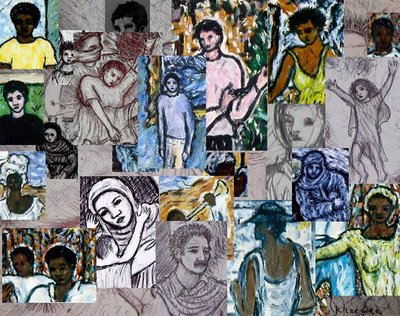
Psalm 85: 8-13; Ephesians 1: 3-14
First Church of Christ, Cong’l, *******
July 16, 2006
Chosen. What a powerful word. Think about what it means to be chosen. You have been chosen. It feels grand to be chosen, doesn’t it? Well, if it’s something good, yes. Remember back in elementary school, when teams would be chosen for kickball during recess? It felt great to be among the first ones chosen; it was humiliating to be chosen last. You knew what kind of player your friends thought you were based on when you got picked for the team.
There are so many wonderful opportunities to be chosen: a part in the school play or local amateur production, class president, singing the national anthem at a ballgame, graduation speaker, prom date, friendships, relationships, the one who wants to marry us, scholarships, teaching fellowships, awards, job interviews, promotions, college applications and essays, sports and academic teams, a published book or poem. It’s thrilling when we are chosen, when we are needed, accepted, desired, wanted, required. It’s as though our purpose in life has been suddenly illuminated for that brief instant and we think “Wow, me?” or “I’m glad you finally saw the light of day!” We know ourselves to be joined in creating something special, which may not have been the same if we were not a part of it.
There are times we’d like to think that we’re important, that somehow our corner of the world hinges on our participation in it. Then we are chosen for something we’d rather not do and the measure of our importance conveniently shrinks. Sometimes our talents are matched perfectly to the chosen task; often we can be chosen to do something for which we feel wholly unqualified and we wonder just who is in charge.
When we are chosen for something in the church we oftentimes feel the latter: feelings of inadequacy, that we’re not the right person for the job, they should find someone who is more faithful, who knows more about the Bible, who is a better public speaker. We may wonder if God’s hand is really in our being chosen. What can God be thinking, asking us? What plan does God have in mind?
In today’s epistle lesson, Paul tells us that God is thinking about grace and has been doing so since time immemorial. Grace has been the plan all along. God “chose us in Christ before the foundation of the world to be holy and blameless before him in love. He destined us for adoption as his children though Jesus Christ, according to the good pleasure of his will, to the praise of his glorious grace that he freely bestowed on us in the Beloved.” Even though we are made in God’s image, even though we are of God’s creation, we are in need of adoption because we rejected this image, this creation when we sinned against God and chose our own way. God gave humankind free will and we did not choose God and the way of love. But before the foundation of the world, God adopted us, chose us in Christ, even before we had an opportunity to reject God.
Any of us who are parents know what it means to choose our children, to choose that they will be ours, no matter what, long before they are born, whether they are born to us or to their birth parents. We know we will never stop being their parents, come what may.
Recently, a longtime friend of mine, Andy, wrote in his weblog about when he was adopted, or as his parents told him, chosen. He writes, “My mother explained that after the adoption process was complete (a two + year process) my parents were asked to ‘select’ their child. Apparently there were ten babies, all chosen to match up with my parents heritage, who were ‘available for adoption’ and my parents were asked to choose their first child from this group. Now, I was a goofy looking child. I was cross-eyed and had ‘creative’ hair that went wherever it wanted to. I've seen the pictures. Believe me, it's true. Goofy goofy goofy looking child. How they chose me I figured that I would never know. So one anniversary I finally asked my Mom, ‘If I was so silly looking, then how come you chose me?’ And my mother smiled and said, ‘We chose the baby that needed the most love.’” And each year his family would honor (and still does) the day that he and each of his siblings were chosen as well as the day they were born.
But not all adoption stories are so happy like my friend Andy’s. In some cases children do not attach or bond themselves readily to their new parents, no matter how much they are wanted, no matter how much they are sought after. If they are at an older age, they may be afraid that they will be abandoned again. They have difficulty trusting anyone. They believe that they don’t really belong, that they aren’t anyone’s son or daughter. They act out their anger with their parents, their siblings, their teachers, with anyone they might feel tempted to be close to. It can leave parents at their wits end, knowing they have done everything to tell their child that they love them and that they are wanted.
But we can’t give back our children, nor do we really want to. All any parent can do, when their child is in pain, whether adopted or not, is love that child even when they don’t deserve it; especially when they don’t deserve it.
It is this grace that God offers us, each one of us adopted as God’s child, as the apostle Paul puts it. And it is God who does the choosing, not us. We do not choose who is adopted, who is among the chosen; God is the chooser, the ‘decider’. And through the life of Jesus the Christ we see who God chooses: the poor, the outcast, the sinner, the weak, the forgotten, the oppressed, the meek, the peacemakers, those who hunger and thirst for righteousness, those who mourn, those who are pure in heart, the poor in spirit, those who are persecuted for righteousness’ sake. Jesus didn’t hang out with, or make himself out to be one of the insiders, the winners, the eloquent, the brightest, or the star. He traveled with and lived as one of the outsiders, the losers, the plain-spoken, the simple, and the ordinary.
Are we with those whom God chooses in Christ? Are we with those whom this world rejects, yet God chooses? Like the story of the sheep and the goats, about feeding the hungry, visiting the sick and imprisoned, clothing the naked, as if we were serving Christ himself, we all score as goats. Even though we, the apparent insiders, live apart from those whom God chooses in Christ, still God chooses us too. Even so, God chooses us too. Not only chooses us but lavishes on us the riches of God’s grace, forgiving our sins and redeeming our lives, and calling us sons and daughters of grace. In Christ we have also obtained an inheritance…so that we might live for the praise of his glory.
This kind of choosing shows us at once how insignificant and how precious we are. We are chosen not for greatness in the eyes of the world but chosen so that we might live for the praise of Christ’s glory.
Jesus the Christ is called the ‘only begotten son of God’ because he did not turn from God. He did not have to be adopted into God’s family through grace because Jesus was faithful to God and God’s way of love for all people. And it is through this Chosen One, through this particularity, that God reveals infinite grace and chooses us. When we sin, when we choose one kind of person over another; when we choose to live separate from God and God’s love and power to heal, when we behave in such a way as to think we don’t deserve love, it is especially then that God does love us and adopts us, chooses us once more to be children of love and grace.
One of the slogans of the Still Speaking campaign is: No matter who you are or where you are on life’s journey, you are welcome here. We, who have been chosen by God and God’s grace, cannot deny anyone God’s choosing of them in Christ. If you’ve seen either of the ads, both are about how the United Church of Christ doesn’t reject anyone. I’d like to see an ad that shows what it means to be chosen, that illustrates the power of being chosen by God’s grace to transform lives and congregations. There are some who have suffered abandonment from the world, who have been orphaned from their family of faith, yet they desperately want to belong to a community that accepts them as they are, who would adopt them as they are, just as we, who were once orphans, who were not a people, have been adopted into this family of faith and now know ourselves as belonging to God.
In response to being chosen by God, how might we live for the praise of Christ’s glory? In your life together as a family of God, what would bring glory to Christ? Who is missing in the family of faith, the Church universal? Who are the chosen, the adopted children of God’s grace not present, not welcomed? Redemption was God’s plan all along; not just for some but for all. When we come together to worship, our gathering is incomplete. The family is not whole, thus, neither are we. For that reason, we are chosen to be sent into the world, to seek out our adopted sisters and brothers, to extend God’s grace to all people, giving the Good News that we are all children of God, chosen by God before the creation of the world. Amen.
Wednesday, June 28, 2006
Monday, June 26, 2006
If one picture is worth a thousand words...

Yesterday was our 12th wedding anniversary. People still call us "honeymooners", in the best sense of the word.

This is the last blog about my trip to Mexico. I figure pictures can say it better than I can. I've put the names of folks from my church but not the children, out of concern for privacy.

Joan.
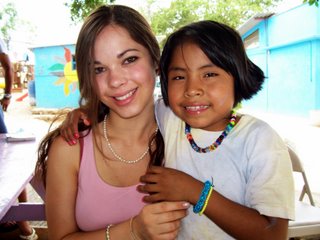
Kristen.
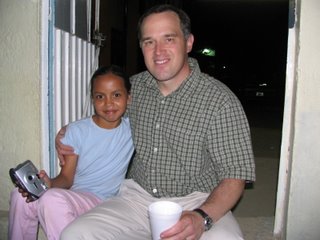
Our pastor, Pete.

Kristen Graves of Simply Smiles, Carol and Francisco, directors of Casa Hogar, and Bryan Nurnberger, founder of Simply Smiles.


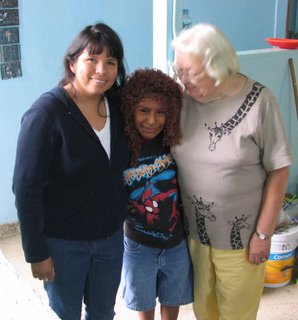
Shirley and Harriet.
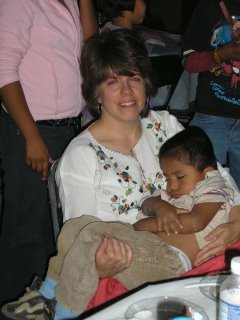
Me with weepy eyes from saying 'goodbye'.

Lynn, trip director.

Sheila.
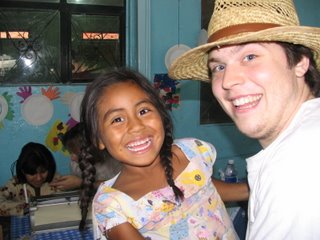
Lucas.
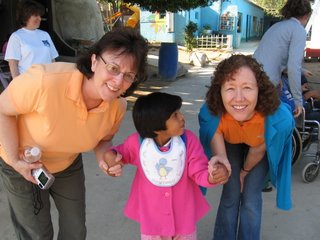
Debbie and Judy.

David.
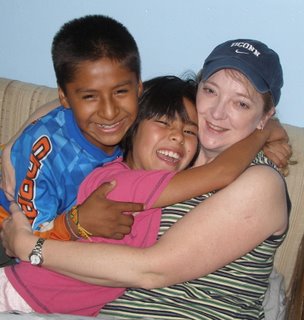
Cindy.

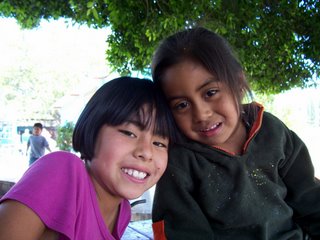
Dios te bendiga, mis amigos. Gracias e adios.
Tuesday, June 13, 2006
Language

On the last leg of our flight to Oaxaca, we were on a regional jet with only one flight attendant. We could tell she was from Texas; she had that twang goin' on. The Houston/Oaxaca flight is a back and forth shuttle; about as common as New York/Washington D.C. but with not as much regularity. About the one thing you can count on is that some folks on that plane will be speaking Spanish as a first, perhaps only, language. So you would think that it would be a job requirement for crew members to speak at least passable Spanish. First, we were all a bit shocked at her pronunciation of Oaxaca ("oh-ah-haa-ka"). Then, when she was handing out sandwiches (turkey or ham), she asked a Spanish-speaking passenger "Paa-vo or haa-mo" which should have been "Pavo o hamon", the "h" remaining silent. This then became the joke of our week, adding more words to this Texas-twang Spanish lexicon: sinko de may-yo, gray-see-as, poor fay-ver, con kay-so. I think it helped us relieve our anxiety about our lack of Spanish as much as it was just plain stupid. Plus, Texas just seems like one big target to most folks.
The very existence of language, spoken or written, is divisive. If you can't speak the language, if you don't know the 'lingo', then you're out. Even if you speak the same ethnic or national language, there's jargon, colloquialisms, culture, slang, dialect, accents, and code words to contend with. In groups we use these as a type of shorthand; a way of defining identity to bolster the group consciousness. Eventually it becomes the language of those who are 'in', and if we are trying to increase group membership, we spend a tremendous amount of time and effort (but not really enough) to indoctrinate the newbies into the glossary of terms.
Take churches, for example. Do you know what a narthex is? Or the chancel? How about acolyte, doxology, scapula, chasuble, polity? It has been recommended that churches stop using words only used in church and choose a common language, one that is spoken outside the church as well as inside, so as to welcome unchurched folks into their midst. Some people resist this because then the church becomes more like an auditorium or concert hall than a church, a sacred place. At the church where I worship, we do not call it a sanctuary but a meetinghouse, which goes back to our Puritan forebears. The space is made holy by what we do there, thus any space, any place can be made holy (or not) by what we do, what language we speak.
Yesterday evening I was watching my 6-yr. old daughter play kickball with the rest of her classmates against another 1st grade class. I noticed the boys knew the language and rules of the game while the girls had to catch on. Of course this made perfect sense; many of these boys play little league and/or go to or watch baseball games with their fathers. I wondered why no one spends enough time teaching girls the same language; after all, baseball is our national pastime. But then it hit me: none of them will grow up to play professional baseball. There's softball available to them, sure, but it's not the multi-billion dollar business that baseball is. I discussed this with my husband as we watched the game; I could hear just the slightest edge of defensiveness in his voice, but perhaps that was a cover for the sorrow over what this meant for his daughters. It's tough for any 'in' group to admit they've kept people out, even if it was unwittingly.
I think there's a time and place for men to have their own language and meanings and for women to have the same, and to be exclusive for a while, to take a break from the Mars/Venus shuttle run. It's when it becomes divisive and systematically exclusive that we then create more distance and the need for a space shuttle just so we can communicate. None of us knows everything; we're all in need of learning, thus gaining the humility we need to teach what we do know.
Whatever language we speak, even if it is the most eloquent, if we do so without love, we all sound like a noisy gong or a clanging cymbal, says the apostle Paul. The move to unify our nation under English is without love. Joking about a working woman's twangy Texan Spanish was without love. Not learning enough Spanish before we left was without love. Some of the most loving moments I lived in during our mission trip and throughout my life are those when hardly a word was spoken. Sometimes, words are just not enough.
Saturday, June 10, 2006
Communion
It was Wednesday, the middle of our trip; it became the pivot upon which our week turned. I spent the morning putting sealant on the concrete dome-shaped computer lab with Cindy, a mom in our group, and some of the kids. After we finished I went into the room where the weekday morning prayer/Bible study led by Francisco, one of the directors, was being held. My Spanish is minimal but his wife Carol, mindful of this, translated for me. It was good just to sit and sing and listen to some songs in Spanish, and meditate in my own way.
When prayers were over, it was time to board the bus for our noontime mission and afternoon excursion. The kids and staff had prepared over 100 ham and cheese sandwiches plus a huge container of punch for us to take to the workers and residents of the Oaxacan city dump. There are 40 or so families who live and work there, culling recyclable plastic bottles from the mountains of garbage. They bundle up the plastic, load it on trucks, and it is then sold to a Mexican mafia who pays them about 400 pesos (40 dollars) for the week's work: 10 pesos (1 dollar) per family. Some of their food they scavenge from their findings. They work from sunrise to sunset, in 80+ heat, surrounded and permeated by the stench of rotting garbage. Imagine some of the worst stuff they could find, and they have found it and probably worse: medical waste, including syringes, dead animals, smells so bad they could be seen escaping from the just-ripped plastic bags.
This work of delivering lunches to these resident workers twice a week is a mission of the orphanage; the children fight over who gets to make the sandwiches and then deliver them to the folks at the dump. Children who are the recipients of mission also get to give to others so they see themselves as having something to give and so to share with others. But this week the children are grounded because of misbehaving, so it is up to our group and a group of college kids that have also been working at Casa Hogar this week to deliver lunch.
We have been told by Bryan (see Simply Smiles) that these people, upon introduction, might offer us their arms instead of their hands because of how dirty and bacteria-ridden they are. He urges us to shake their hands anyway. For Jesus there were no 'untouchables'; only people in need of human connection. We stop on the way to buy a huge sack of oranges to augment the meal. The trip takes about 30 minutes; the dump announces itself in its usual way. We pass by corrugated tin shacks that house these families and others; no running water, no electricity. We pull into a no-longer-used sorting station that gives us and the workers some shade to visit in. They see the bus and come in a few at a time, hestitant at first but then I get a sense of hospitality as they open their home to us.
I help dole out the cold drinks in plastic cups, giving a smile to substitute for a greeting in my crude Spanish. Then we grab the bags of sandwiches and oranges and hand these out. Soon everyone is digging in. I go and sit with a young girl, maybe 5 or 6, and her little sister, who seems to be about 2 or 3. I figure the little one's Spanish is about the same as mine, so I am in good company. She takes her sandwich apart and hands the half with ham to her big sister; she then proceeds to take pieces of the string cheese off the bread and eat them. Like any mother, I suppose, I start to make yummy sounds and rub my tummy as if to say "that must taste good." Instead she interprets my gestures as signs of hunger, peels off a piece of cheese and hands it to me.
Her hands are grimy and so are mine. I hesitate for only a nanosecond; what can I say...no, thank you? I take the cheese in my fingers and put it in my mouth, smiling at her, careful not to let the tears rise. And I think in some small way, she smiled back.
I have had Communion in more ways than I can count. I've had wafers, white bread, wheat, pita, little shortbread squares, and shortcake biscuits; Oreos and milk; crackers and grape jelly; I've had grape juice, red wine, and whatever awful searing stuff Catholics serve. I've been in all kinds of places: cathedrals, churches, camps, mission trips, retreats, the ocean, the mountains, the city, suburbia, rural town, in other countries, even on an airplane. It's been served all kinds of ways: in the pew, at the railing, by intinction (rip and dip, as we said in seminary), in a circle, at a table; in little cups (glass and plastic), on silver and brass plates, glass pitcher and goblet, stoneware, paper plates and cups, on an antique wooden tray with spindles to hold the tiny glass cups in place. I've served, and been served by, all kinds of people: men, women, children, teenagers, priests, ministers, laypeople, even served by a pregnant woman once, which I thought was meaningful on several levels, considering it was a Catholic retreat center.
But it has never meant as much to me as it did that Wednesday afternoon in the Oaxacan city dump, served to me by a little girl with filthy hands and an open heart in a place ridden with decay. Outside of marriage, it was the purest moment of Communion I've ever experienced. God does not waste anything, including people. We may do that to be certain, but through that little girl, God was visible, incarnate, real.
Whenever you do this, remember me, Jesus said. Remember love, remember compassion, remember sacrifice, remember grace and life and forgiveness and justice and peace. And whenever I take communion or serve it, I'll remember her, too.
Wednesday, May 31, 2006
Down in Mexico
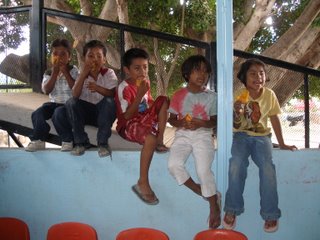
That tune by James Taylor has been running through my head ever since I got back. When our group first entered the U.S. in Houston, it felt like a foreign country: all the fast food, shops, cell phones, and fast pace. Now that I am in my home again I still feel as though I am a foreigner, a stranger in my own life. I am not the same person I was when I left. I once read that "the truth will indeed set you free, but first it will shatter the safe, sweet way you live." I have never known that to be more true than now.
Even though I am exhausted, physically and emotionally, from this past week, I miss the children and their patience with this gringa who speaks Spanish un poco; I miss the little store down the bumpy dirt road with fresh vegetables, those sweet yellow mangoes, and the family whose lives depend on it; I miss playing the never-ending Uno game with Luiz and Luz and others and their patois sign language arguments over who is cheating; I miss the little girls I met at the garbage dump and wish I had more Spanish so I could listen to them; I miss the quiet walks through the village at sunrise, broken by the sounds of roosters and dogs.
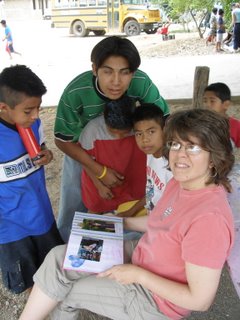
I have stories to tell; I'm just not ready to tell them. I have so much emotion, so much meaning inside; I just don't know yet how to live my life with them. I know my life and how I live it must change. I'm still praying and waiting. I have no doubt that God is leading me; I just don't know toward which step, but it is already difficult to remain empty, to not fill and cover these feelings, to empty myself of that which I do not need. I know that in order to make music, a drum, a flute, any instrument must be empty; that we have no use for love if we are full and content; that true compassion requires sacrifice and humilty.
One of the Five Remembrances of Buddhism says that all we have are our actions. Everything else is temporal. I pray that my present actions, and those that I choose, may be worthy of the experiences of the previous week.
More to come in the days and weeks ahead...
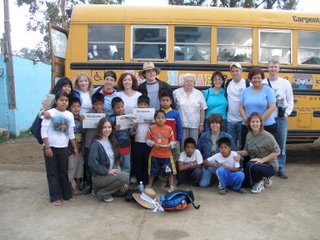
Friday, May 19, 2006
the Blog...it MOVES!!!
Click here for a map of Oaxaca.
Adios! Hasta luego!
Sunday, May 07, 2006
A 'Comma' Kind of Love
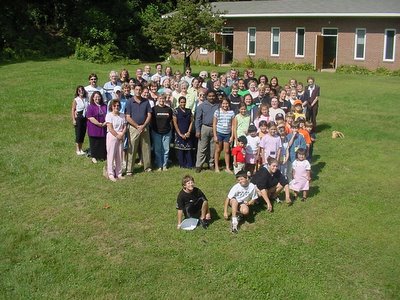
Ps. 23; John 10: 11-18; 1 John 3: 16-24
******** United Church of Christ
May 7, 2006
Do you remember when this picture was taken? I was told you had just had a fire drill (I don’t know of any other church that does fire drills) and came out onto the lawn for the picture. You can see that the doors to the church were left wide open; a very telling gesture, with more than one connotation. A number of you are wearing your ‘God is still speaking’ t-shirts. It’s a beautiful warm day yet you all chose to come to church: about 60 adults and 20 kids. Although it appears your pastor is missing from the picture, really she is not. She’s the one perched on top of the ladder taking the photograph. And she formed you in the shape of a comma, as a way of saying that God is still speaking through you. God is not finished with you; praise God!
Seeing all of you in this picture got me thinking about the kind of love to which God calls the Church to be and to reveal and to practice. A comma, in all its simplicity, is a wonderful illustration of this love. It is a love that is open-ended, without limits and conditions. It is a love that possesses a willingness to be led, toward the yet-to-be-realized future of infinite possibilities. It is a love that has the ability to let go of the outcome and of our desires for the sake of the other. It is a love that we know in this way: that Jesus laid down his life for us. Jesus’ death on the cross was a comma in the expression of God’s love for us.
We’d like to think that it is love that motivates everything we do in church. We’d like to think that way. But we know, we know what lurks inside our hearts, and indeed, our hearts condemn us. We are not always willing to be led; we are a stubborn lot. Sometimes we place limits and conditions on our love. Often we try to control and manipulate the situation at hand, not to mention a few people, so as to quell our fear and satisfy our own desires.
We’re not all that different from the early Christians; in fact, we haven’t changed much, in that we still need to hear the ancient words and how they speak to us today. When the apostle Paul wrote his famous chapter on love in his first letter to the Corinthians, about love not being envious or boastful or arrogant or rude, he did so because the brothers and sisters of the Corinthian church were behaving exactly this way with one another. It always tickles me when couples choose this passage for their wedding, thinking that it is such a romantic passage about the feeling of love. Love, in the Bible, is hardly ever a feeling. In God’s lexicon, love is an action verb. And for we who are Christians, we see this most clearly in the life, death, and resurrection of Jesus.
In the Heidelberg Catechism, the FAQ (frequently asked questions) on Christian life, it is asked of us, “What is your only comfort, in life and in death?” The answer: “That I belong—body and soul, in life and in death—not to myself but to my faithful Savior, Jesus Christ.” To love is to lay down one’s life for another, to acknowledge that our lives do not belong to ourselves but to Christ and to the world. Author M. Scott Peck defined love this way: “The will to extend one’s self for the purpose of nurturing one’s own or another’s spiritual growth.” He recognized that our motives are rarely pure, especially when we love. That is why we follow Jesus, God’s Anointed One, who shows us how to love, how to extend ourselves for the well-being and wholeness of the other.
When I first dreamed of becoming a minister, I thought I was laying down my life for others, in what I thought was the single response I could give for Jesus laying down his life for me. The words of the hymn “When I Survey the Wondrous Cross” brought my heart to its knees: “Love so amazing, so divine, demands my soul, my life, my all.” I never thought I would be called by God to lay down my ministry for another calling, that of motherhood and marriage partner. But over the years I have seen how being a mother has made me a better pastor and how not being a pastor has made me a better mother. This time of letting go of my vocation is but a comma in God’s call in my life. There truly is no “THIS IS WHO YOU’RE GOING TO BE—PERIOD!” in being led by God. God calls us to be many things in many places but through it all, God calls us to love. And to love is to lay down our lives, to be willing to be a comma in the grand scheme of building the kingdom of God.
When we are willing to be led, when we are so eager for God’s wholeness to come to everyone, when we are keen to love without regard to ourselves, we begin to live without fear. When we realize that our future and the future of the Church does not depend solely on us but is in the keeping of the One who leads us, we then become capable of amazing things. We become Easter people and an Easter church: loving, letting go, dying, rising again; working, praying, singing, giving, welcoming, suffering, and loving even more. Instead of trying to change the hearts of others, it is our heart that is changed, opened, and healed.
In your church covenant you have promised God and each other that you are willing to be led by God’s Word and God’s will. You affirm that you are open to the Holy Spirit to lead you and empower you. You state that you are willing to walk with each other as you follow Jesus. You assert that you are forward-looking toward that kingdom of God. And even though you live as a people who love each other, you do not say so out loud in your covenant. Many of you have been here for a number of years, through good times and bad, through hardship and celebration, through death and new life. Why not declare before God and everyone that you will be there for each other no matter what, that you promise to love each other, not only in feeling, but in action? If you are willing to be a ‘comma’ kind of love, then you must practice; and as part of your practice you need to state it in the form of a promise, a promise that is renewed each time you say it.
Saying you promise to love each other is a ‘comma’ kind of love in and of itself. It doesn’t mean you have to like everyone. It doesn’t mean you have to be perfect at loving others. It doesn’t mean you will do everything that is asked of you. To promise to love someone means some days you will give whatever you’ve got and other days you may not be able to give at all. To promise to love someone, to lay down your life for others can mean many things but above all it means that love, the essence of which we know through Jesus, is more powerful, more humble, more radical, more than anything else that might try to undercut that love. By promising to love we admit how fragile we are and our need for God’s grace to live by this promise and to rekindle it each time we speak it.
So, ******** United Church of Christ, how are you living out this ‘comma’ kind of love? How might promising to love each other change the way you worship and work and witness together? What about the future scares you? Inspires you? What is difficult for you about being led? What are the blessings? In what tangible and recognizable ways is Jesus the center and head of your church? How is God calling you to extend yourselves for those in need of God’s grace?
By promising to love, by laying down our lives for one another, in this way we reveal Jesus our Savior, risen from the dead, the One who laid down his life for us. We proclaim to the world that all that serves to destroy love is but a comma, that love itself is open-ended and limitless. We begin to live without fear, to boldly counter a world that uses fear to impose a commitment. We begin to live with true love, love that inspires us to be led; love that calls us to lay down our lives for one another and for our fear-filled world; love that puts a comma after death and leads us to new life. Amen.

